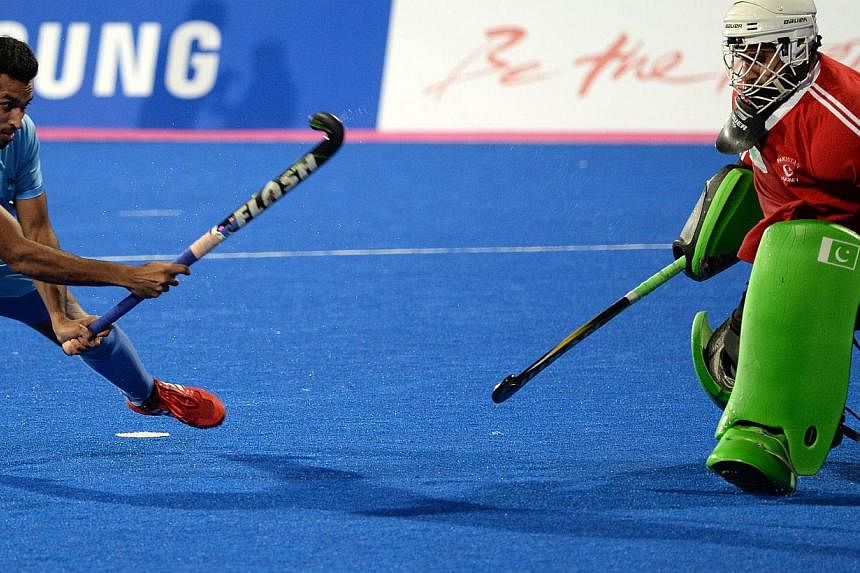THROUGH the winter cold of last year, journalist Sundeep Misra chased a hockey ghost of a hero in the Indian state of Punjab. He was researching a feature film on a hockey legend, the late full-back Prithipal Singh, who won a silver at the 1960 Olympics, gold in 1964, bronze in 1968. Yet everywhere Misra travelled in the footsteps of legend, young Indians he met had the same response.
Prithipal? Who?
India, a nation which owned hockey, now has little memory of it. A land where a hockey stick was a boy's first treasure has now bent to the cricket bat. Friends tell me tales of weary regret: The young can recite arcane statistics on any Indian cricketer yet struggle to name their hockey team.
Across the hockey field from India yesterday, for a first meeting in an Asian Games final since 1982, were Pakistan - neighbours, foes and the fallen, too. If India are world No.9, they are world No.11. If India failed for the first time to qualify for the 2008 Beijing Olympics, Pakistan for the first time failed to qualify for this year's World Cup.
Together, both nations have won 11 Olympic golds, four silvers, four bronzes yet since 1992 there has been nothing.
So every match becomes hope, every gold medal won even at this level is a chance to spark enthusiasm for the sport in their nations. It is why when India won, 4-2 on penalties, after 1-1 in full time, the players danced, they flung their shirts into the crowd and for this brief moment hockey was again their beautiful game.
This was no ordinary night, for on this ground, and across the city, ancient rivalries played out between nations that once were one. India and Pakistan have, according to one estimate, played over 150 times in hockey since the 1950s while North Korea and South Korea have tussled over a football 16 times since the 1970s.
These nations, all of whom have fought wars, do not play each other regularly these days and so these meetings carry a sweet and temporary togetherness. Sport does not heal but it allows for civilised engagement within the rules. And so even as all four teams played for their futures, history still hung in the air.
The hockey stadium didn't feel like a part of Incheon but in fact a slice of the subcontinent. Pakistani fans hollered and Indian wrestlers showed up to add muscle to their team. Spectators can occasionally live in the past and try and rekindle enmity, but not this day. Perhaps because both teams are struggling, there is more empathy than animosity.
No provocation was seen on the stands and nothing but sport displayed on both hockey ground and football pitch. Athletes anyway are usually the sanest folk amid heated rivalries: They play the game, they do not pretend to be armies. Sport, literally and figuratively, is about moving ahead, and it is what both teams did.
The hockey final - the winners were promised Olympic qualification for Rio 2016 - wasn't glittering because big finals are no longer routine for these teams. Pakistan started smoothly, going up 1-0 in the third minute, then India levelled in the 27th minute.
Soon the differences were apparent. Pakistan shimmered individually, superior in flair, but this was hockey old-style. As Terry Walsh, the legendary Australian who is India's chief coach, noted: "You can't play with passion alone. Individually Pakistan were brilliant. But there was a more measured understanding to the Indians." In short, organisation beat dazzle, structure defused flair.
The match done, Indian captain Sardar Singh, flag in hand, looked like a man with a weight removed. He comes from the same part of India as Prithipal Singh and perhaps there was a lesson here. India should not forget their great past but should start living in the present. As Walsh said, no one in Germany or Holland, both grand hockey nations, speaks of the past. One must cherish old heroes but India can only change if it embraces new ones.
It was a fine day for sport for across the city you could almost hear the pounding of heartbeats. South Korea won in the last minute of extra time and India, after missing numerous chances, on penalties. Out at the football pitch, the defeated North were loudly hailed. Here at the hockey arena, a moment of quieter grace prevailed.
Long after the final whistle, a small bunch of Pakistani fans stood forlornly draped over a railing. But when their dejected players walked off, they clapped in appreciation. And when the Indians strolled by them, they applauded in respect. It was a night, after all, only of sport.

